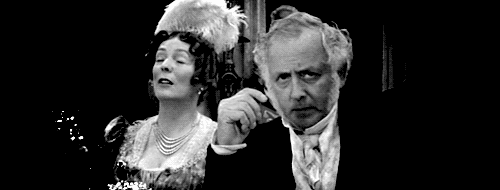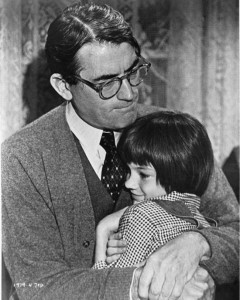Being a father ain’t easy, and it’s nigh-on impossible to pin down the archetype of a great dad. But, literature has certainly tried.
As a follow-up to my Literary Mothers post, I thought I’d do a corresponding post about literary dads just in time for Father’s Day on Sunday. Literary fathers certainly run the gamut when it comes to character: they can be heroes or villains, role models or examples of how not to be, loving or distant, protective or abusive. But the men on my list all share one thing in common: they love their children, and want what’s best for them in this wild, complicated world.
And so, with no further ado (and in no particular order), here are my top 5 literary dads!
Joe Gargery, Great Expectations by Charles Dickens
Although technically Pip’s brother-in-law, Joe Gargery is the closest thing the boy has to a father. Joe is passive, and often downtrodden by his overbearing wife, but he is also kind and loving and adores Pip as his own. He gives Pip much-needed affection, passes him extra food under the table, and when Mrs. Joe is on a rampage, he tries to protect Pip from her verbal and physical abuse. He loves and supports Pip unconditionally, even when Pip inherits a mysterious fortune, moves to London, and becomes an imperious, pretentious, unbearable ass. Now that’s what I call a good father!
Mr. Murry, A Wrinkle in Time by Madeleine L’Engle
It’s pretty hard to not love a dad who nicknames his daughter, Meg, “Megaparsec.” Mr. Murry is absent for a large portion of the book, and the plot revolves around Meg’s drive to find her lost father, based on the certainty that he has not abandoned her and her family. Mr. Murry values Meg’s intelligence, strength, and inner beauty, and encourages his daughter to recognize those qualities within herself. Though his instinct is to protect her, he also recognizes that she’s smart and strong and has to figure some things out on her own.
Mr. Bennet, Pride & Prejudice by Jane Austen

Mr. Bennet is not the perfect father. He tends to be dismissive and passive aggressive towards his wife, often holes himself up in his study for long periods of time, and lets his younger daughters run wild. But he can also be tolerant, kind, generous, and supportive, and at the end of the day desires nothing more for his brood of daughters than to live happy, carefree lives. He visits Mr. Bingley, even when he originally said he wouldm’t. He gives Elizabeth permission to refuse Mr. Collins even when her mother tries to force her to marry him. And–perhaps most importantly–he admits his mistakes with regards to Lydia and Mr. Wickham, and does everything in his power to rectify them.
Señor Sempere, The Shadow of the Wind by Carlos Ruiz Zafon
Although something of a background character for most of the book, Daniel Sempere’s widowed father is integral to the story. He introduces his only son to the most important thing in their lives; books. Shortly after the tragic death of his wife, Sempere takes Daniel to the Cemetery of Forgotten Books, a labyrinthine homage to bibliophilia that shapes his son’s childhood and sets him on a very particular path through life. Señor Sempere may be quiet and mild-mannered, but he cares deeply for his only son, making whatever sacrifices necessary to improve Daniel’s life.
Atticus Finch, To Kill a Mockingbird by Harper Lee
This list would not be complete without Atticus Finch, hands down the most admired and beloved of literary fathers. A single father in a prejudiced, backwards Southern town, Atticus raises his two children, Scout and Jem, with integrity, honesty, bravery, and love. He teaches them, through example, that might does not make right; that morality is something that springs from a person’s own conscience; and that you can’t judge anyone until you’ve climbed into their skin and walked around in it. And on top of all that, he loves his children for who they are, and encourages them daily to be themselves without worrying what people think.
Happy Father’s day, to all the dads out there!
Do you have any favorite literary dads? Add yours to the list in the comment section below?


0 Comments